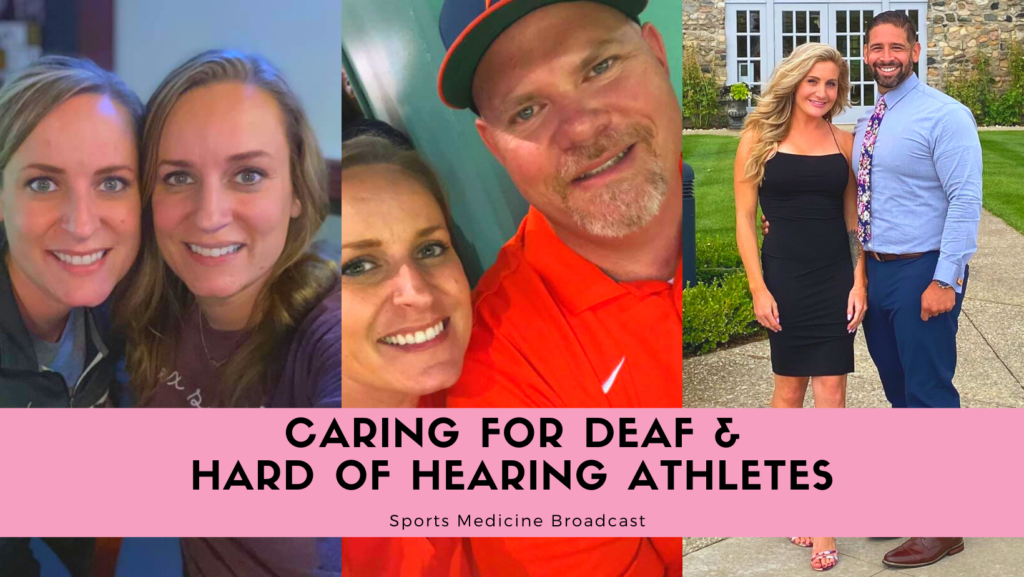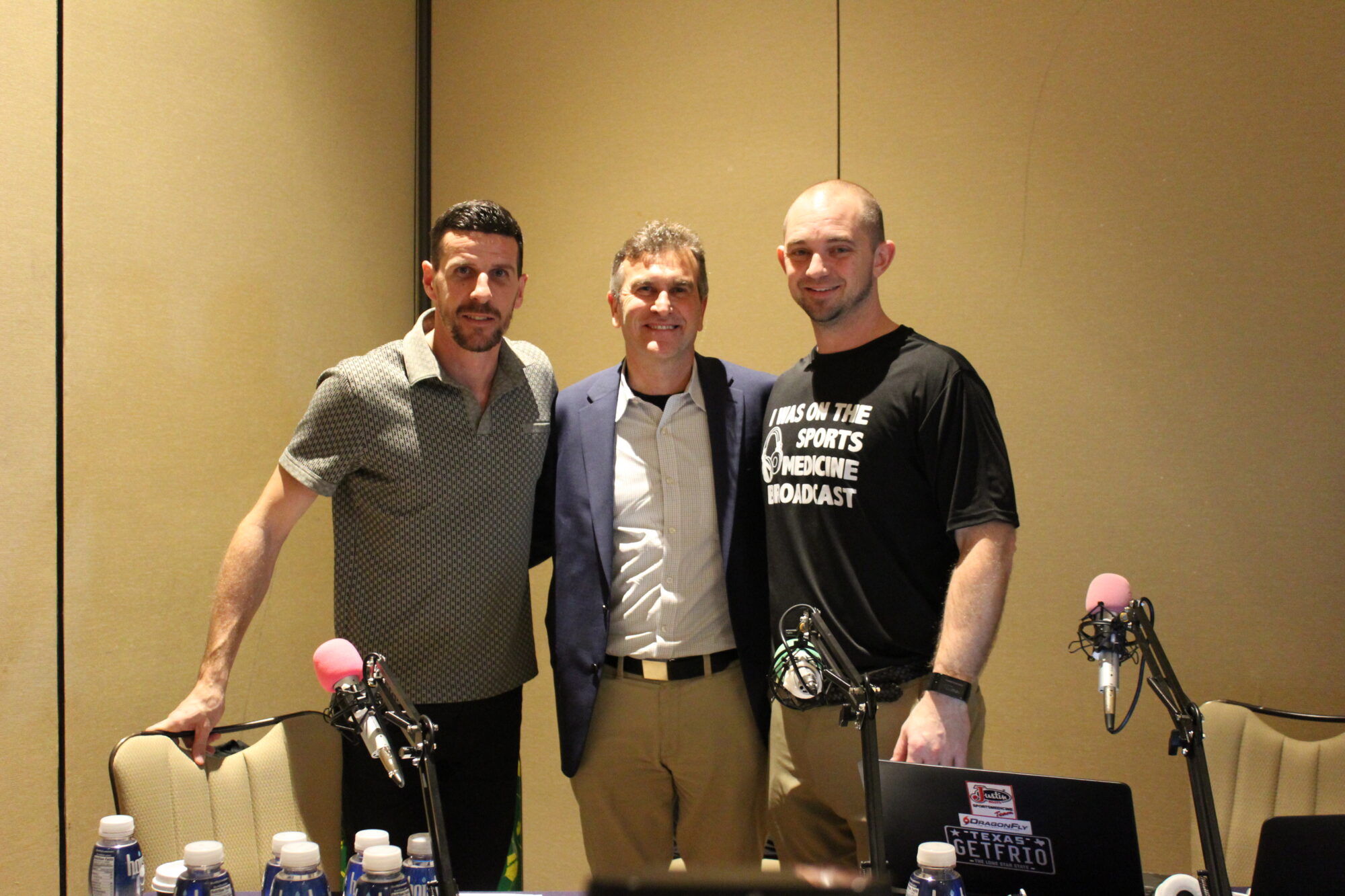Podcast: Play in new window | Download
Deaf Athletes speak a different language, they are not disabled. They maybe Hard of Hearing but not any less capable. We have to learn how to provide healthcare for them the same as the hearing athletes.
Jennifer Warren learned signed language as a kid to communicate with one of her teammates and has continued learning and using the skills through her career.

Josh Woodall and John Ciecko have first hand experience working with deaf and hard-of-hearing athletes and share some ways we can provide more equitable care.
Jennifer, what is the best tip you have for working with hard of hearing or deaf athletes?
I would suggest that the hearing community speak naturally to those who are deaf or hard of hearing. Many can read lips, but when we accentuate our words, it distorts our mouths, which can make it more difficult to read lips.
Second tip, most people who are deaf and hard of hearing appreciate any sign language you may know. Spelling out words or signing slowly is welcomed and appreciated.
John: Communicate eye to eye, never tell the interpreter “tell them this…”, people of various abilities should never be excluded from sports.
Only 30% of the English language can be read on lips, and that’s with perfect lighting and a couple of strong cups of coffee. Helmets, low hats, or any kind of obstruction to see someone's face and mouth hinders this ability to catch what’s being said on the lips. This is why it’s so important for Athletic trainers to learn the basics of ASL.
Josh, give us an example of how you have used this or other tips from Jennifer?
The first week in Bryan ISD I had an athlete with a broken radius/ulna so had to learn real quick how to communicate with an interpreter.
Jennifer, what should we know about working with deaf and hard of hearing athletes?
Not all disabilities are cognitive disabilities. In fact, the deaf community does not see hearing loss as a disability. The deaf and hard of hearing community prefer to be seen as a community that uses a different mode of communication, rather than a group with a disability.
American Sign Language is considered a foreign language, which is simply a different mode of communication. The need to use sign language is comparable to the need to use Spanish when a student’s primary language is Spanish. This means that deaf or hard of hearing students are very capable or able to participate in athletics and other extracurricular activities.
Also, the words ‘deaf or hard of hearing’ can seem like a harsh way to describe a people group, but it is actually what is accepted and preferred by the deaf community.
And, Deaf and hard of hearing students may not hear the starter’s gun or whistles blowing. Adjustments may need to be made to allow for access to the audible elements of the sport.
Discuss some of the hearing devices and how we can protect those for participation.
Most students self-care for their devices by the time they make it to the secondary sports level. But, AT’s (Athletic Trainer/Assistive Technology) may find it helpful to know how to support these athletes:
FM systems – wireless assistive hearing devices that enhance the use of hearing aids. The coach or AT may wear a mic that is bluetoothed to the student’s hearing aid or cochlear implant. This allows the student to hear direct voice from the coach or AT.
Hearing aids -small device that fits on or in the hear to amplify sound
Cochlear implants – small device that consists of an external portion that sits behind the ear and a second portion that is surgically placed under the skin. The device has several parts that help reproduce the effects of sound.
It may be helpful for the AT to offer a secure place to store the devices.
John: actual sound or noise that comes through the auditory devices can vary from what you and I hear as hearing individuals, which is why it’s not always enough for effective communication especially in a loud setting such as an athletic field – to keep in mind for ATs
What is something about this population that is probably misunderstood?
Language (foreign language)
Disability vs Mode of Communication-little to no modifications to be able to participate in sports
Deaf Culture-
John: Actual athletic ability is affected or that someone who is deaf or hard of hearing “don’t understand”
Accommodations needed
Section 504 and the ADA require that “reasonable accommodations” must be provided for an individual who can establish that he has a “disability” and that he is “otherwise qualified” to participate in the sport or activity in question. An accommodation can be an interpreter, lights or whatever is dictated by the student’s 504 plan.
Talking slower or louder does not help! However, facing the athlete and speaking directly to them does.
Deaf individuals also rely on facial expressions (the picture of me proposing to Jenny with my eyebrows raised indicates a question!)
Have empathy!!!
What are some “PC” or non-PC things to say or talk about regarding our hearing-impaired athletes?
Auditory Impairment or Hearing Impaired is now replaced with Deaf and Hard of Hearing.
Watching people have a conversation in sign language is the same as eavesdropping a verbal conversation.
Josh-example of working with interpreters (interpreters translate what is being said exactly the way it is said).
Signs we want you to know
Help
Thanks
Yes
No
Pain
Water
Name
Podcasts or Youtube channels you like for learning more?
https://www.amazon.com/Sound-Metal-Riz-Ahmed/dp/B08KZCFW1C
SpedTalk by John Bullion
Twitter: @spedtalk2020
Lifeprint.com for learning sign and about deaf culture and history
Signingonline.com – For full lessons (fully online) based on a two-year curriculum. Used by high schools, colleges, and universities for their 2-year world language credits. Also used to obtain CEs (WHICH I'M PUSHING THE BOC TO ADOPT)
Contact Us:
Jennifer – @JennInmonWarren on Twitter
Josh – @jwoodall79
Jeremy – @MrJeremyJackson
John – @JohnCiecko
These people LOVE Athletic Trainers and help support the podcast:
Frio Hydration – Superior Hydration products.
Donate and get some swag (like Patreon but for the school)
HOIST – No matter your reason for dehydration DRINK HOIST
MedBridge Education – Use “TheSMB” to save some, be entered in a drawing for a second year free, and support the podcast.
Marc Pro – Use “THESMB” to recover better.
Frio Hydration – Superior Hydration products.
Donate and get some swag (like Patreon but for the school)
HOIST – No matter your reason for dehydration DRINK HOIST
MedBridge Education – Use “TheSMB” to save some, be entered in a drawing for a second year free, and support the podcast.
Marc Pro – Use “THESMB” to recover better.
